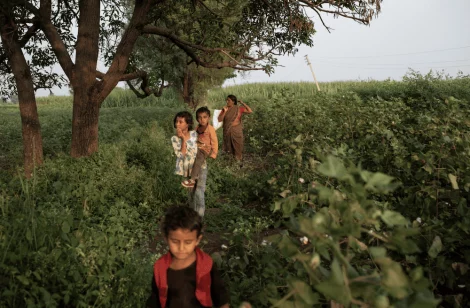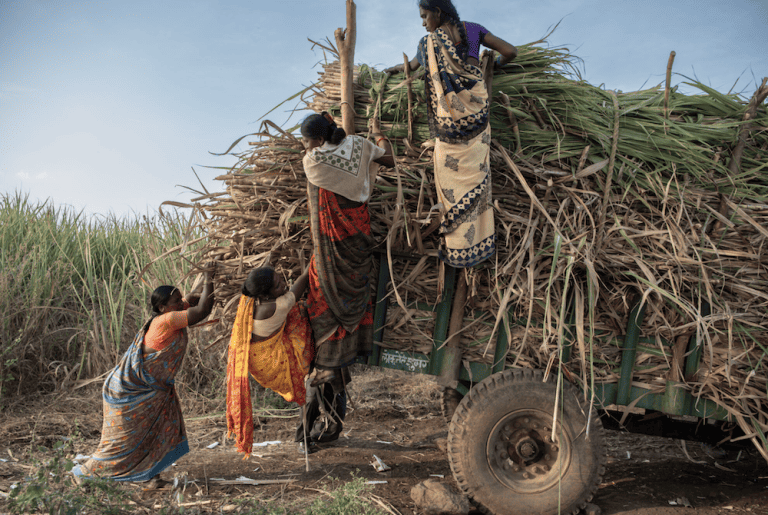by Simona Sirianni
Archana Ashok Chaure has been working since she was not even a teenager in the fields of the Maharashtra state, India, now transformed into a giant of sugar production. She is a child bride, like many unfortunately, forced to toil every day in the fields with no prospect of improvement. Not only that, last winter she underwent what thousands of women here are forced to do, to avoid losing their jobs: a hysterectomy, the only way to avoid being absent from work due to menstruation or various disorders.

The high price of Coca Cola and PepsiCo's business
Chaure is one of the thousands of women, or rather slaves, enduring inhumane conditions to increase the already billionaire earnings of the companies living on sugar production, primarily Coca Cola and Pepsi. Revealing the dark side of the business of the two multinational corporations, an investigation by The New York Times and The Fuller Project has uncovered a shocking reality: brutal exploitation of child labor that even leads to the sterilization of women to make them work tirelessly. A well-established system that includes organized marriages for girls as young as 14, so they can work alongside their husbands to cut and harvest sugar cane and increase productivity.
More Slaves than Workers
A state of slavery, caused by the signing of a contract that imposes working practically without hours and without rights, to repay the advances that employers provide them to move to the area and be able to have a house, if it can be called that, a contract that also requires them to pay a fine if they are absent, even to go to the doctor.
Hysterectomy, the Only Alternative for Women
For this reason, hysterectomy, an extreme consequence of this financial trap, is seen as the only alternative by these young women to keep their jobs, thus avoiding the difficulties they encounter during menstruation in the fields without access to running water, toilets, or shelter. Even the intermediaries who provide them with work lend them money to undergo surgery, further indebting them and forcing them to return to the fields, not only a few days after the operation, but also the following season and beyond. It is enough to know that workers' rights groups and the United Nations labor agency have defined such agreements as "forced labor."
A known system, but with no control
Sugar producers and buyers have long been aware of this inhuman system. Coca-Cola consultants, for example, visited plantations and refineries in western India and, in 2019, reported that sugar cane cutting was entrusted to children and that people worked to repay employers. They documented this in a report intended for the company, which included an interview with a 10-year-old girl.
In an unrelated company report that same year, the company also stated that it supported a project to "gradually reduce child labor" in India. Despite this, however, no improvement in the situation is seen.
Responses from Coca Cola and PepsiCo
The sugar from Maharashtra has been used for over a decade as a sweetener in Coca and Pepsi cans. PepsiCo, in response to NYT's questions, confirmed that one of its major international affiliates purchases sugar right there and has just opened its third production and bottling plant there. However, it wanted to clarify, the multinational, the company, and its partners purchase a very limited amount of sugar from Maharashtra compared to the total production in the state.
Both companies say they have published codes of conduct prohibiting suppliers and business partners from using child and forced labor and that they will engage with their franchise partners to conduct an assessment to understand the working conditions of sugar cane cutters and any actions that should be taken. Coca-Cola, however, refused to comment on a detailed list of questions.
Why does It happen specifically in the State of Maharashtra?
The heart of this exploitation is the Beed district, a rural and poor region of Maharashtra that hosts much of the migrant population that cuts sugar cane. A report from the local government interviewed about 82,000 female workers in the fields and found that about one in five had undergone hysterectomy. The conditions in which these workers find themselves are known and recognized, but abuses continue because, as always happens when profit is involved, everyone says someone else is responsible.
Large Western companies that theoretically have policies aimed at eradicating human rights violations in their supply chains defend themselves by saying they rarely, if ever, visit the fields and largely rely on their suppliers, the sugar mill owners, to oversee labor issues.
These, in turn, claim not to hire the employees themselves, but to do so through third parties to whom they delegate the recruitment of migrants in remote villages, transportation to plantations, and payment. How those workers are treated, they say, is a matter between them and the contractors. They claim that no one forces women to undergo hysterectomy as a form of birth control. However, in the meantime, the workers are dying in the fields as if they were beasts.
A known situation, but the abuses continue
India is the second-largest sugar producer in the world, and Maharashtra accounts for about a third of that production. In addition to supplying major Western companies, the state exports sugar to more than a dozen countries globally. But the abuses stem from the peculiar configuration of the industry in this area. In other producing regions, agricultural owners recruit local workers and pay them a wage.
Maharashtra works differently. About a million workers, usually from Beed, migrate for days to fields in the south and west. During the harvest, from October to March approximately, they move from field to field, carrying their belongings with them. And instead of wages from farm owners, they receive an advance, often about $1,800 per couple, or about $5 per day per person for a six-month season, from a contractor. A centuries-old system that reduces labor costs to the sole advantage, of course, of the sugar mills.
Profit that erases rights
Mrs. Chaure is petite, barely five feet tall, with a tiny gold nose ring in the shape of a flower and a smile that takes up her entire face: "It's easy for people to take advantage of us," she tells the NYT, "because we have no education." She has spent her life cutting sugar for a mill owned by NSL Sugars and started working in the fields as a preteen and, now in her thirties, she plans to continue for the rest of her life. The work has allowed her to support her family rather than remain in the most grueling poverty, although she always has to skip meals to ensure her three children have enough to eat. Mrs. Chaure knows there is nothing for her beyond sugar. But she hopes things will be different for her children.


 Why Arillo in Terrabianca's organic approach is paying off
Why Arillo in Terrabianca's organic approach is paying off What do sommeliers drink at Christmas?
What do sommeliers drink at Christmas? The alpine hotel where you can enjoy outstanding mountain cuisine
The alpine hotel where you can enjoy outstanding mountain cuisine Io Saturnalia! How to celebrate the festive season like an Ancient Roman
Io Saturnalia! How to celebrate the festive season like an Ancient Roman






